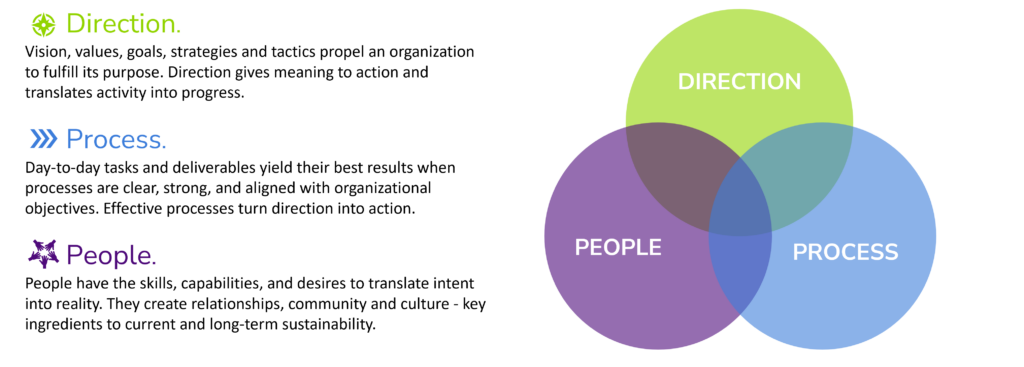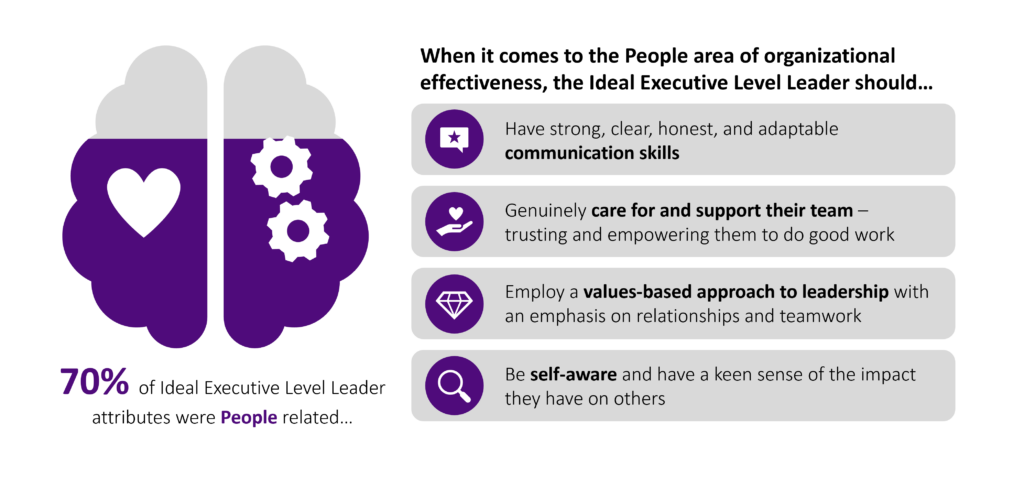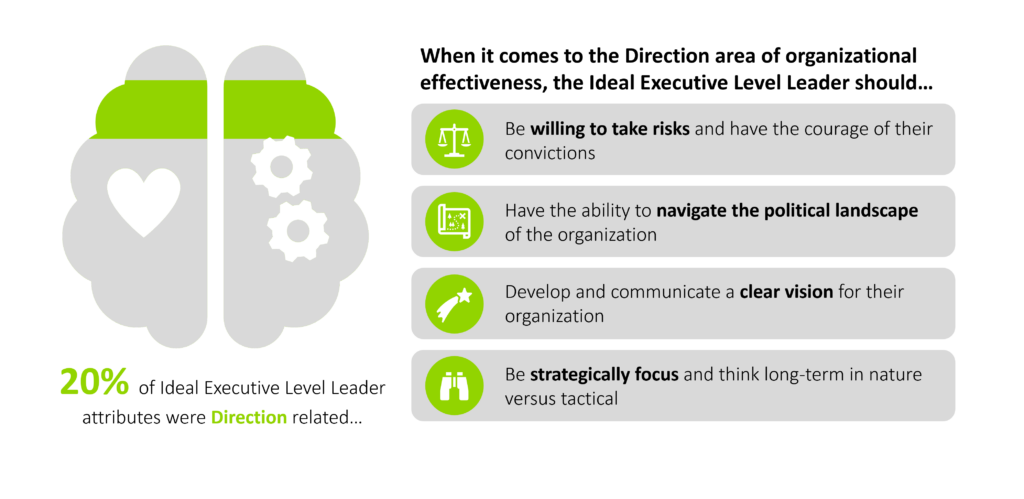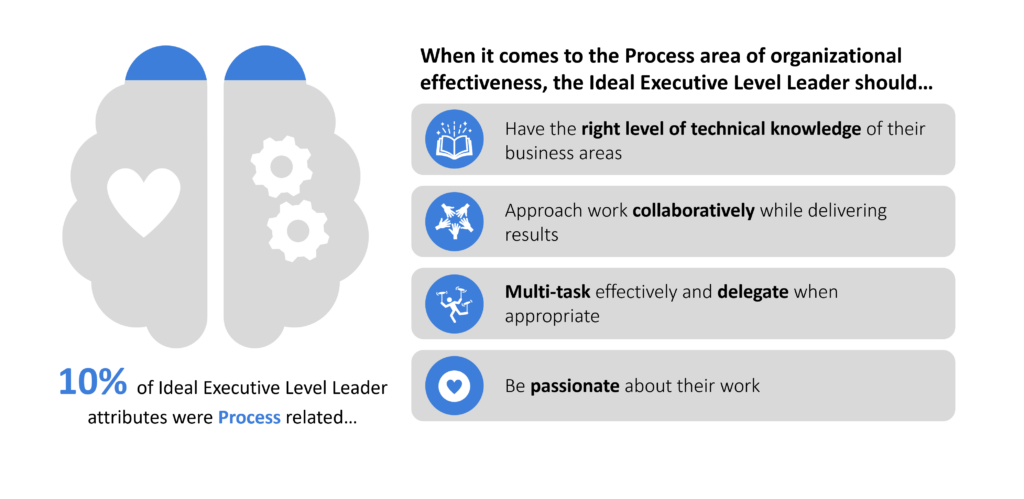Richard Eaton and Mackenzie Farrell
Berlineaton serves alongside visionary leaders working to strengthen their organizations in the areas of Direction, Process and People. As part of our People Development Services, one of our most popular offerings is Executive Coaching. No surprise, helping Executive Level Leaders become more effective can have a hugely positive impact on any organization, as well as the working lives of those leaders and those around them. As a part of our Executive Coaching assignments, we frequently offer our clients an opportunity to benefit from feedback generated via a Narrative 360 review. During a Narrative 360 we conduct confidential interviews with 10 to 12 people who know our client well, including bosses and direct reports, peers, external stakeholders and even family members. We capture this feedback, identify key themes, and then share it with our clients to help inform subsequent coaching sessions.
One key question we ask the people we interview is: “In your opinion, what are the characteristics of the Ideal Executive Level Leader?” We help tease out what interviewees think these ideal leaders – who might be so ‘perfect’ that they don’t actually exist – should do, how they might act, and other aspects of their behaviour that help them stand out. The answers we get to these questions are very helpful in that they give our clients a really good idea of what is expected from any leader in their position. It clearly defines an appreciative ‘North Star’ to support subsequent coaching sessions.
Over the course of the past few years we have collected hundreds of answers to this important, and intriguing, question. We wondered, if we collated all the passionate, creative, and thoughtful answers to this question we’ve harvested over the years what might that tell us about how most people would describe the Ideal Executive Level Leader?
Well, we’ve finally found the time to do that and, below, you will see the results of this analytical effort.
To ensure that this information is most relevant to current workplace conditions, we’ve focused on responses from the 360 Reviews that we have conducted since March 2020: the start of the COVID lockdown. What you will see here is a presentation of the feedback provided during five Narrative 360 engagements, and the hundreds of comments offered up by 54 people who we were privileged enough to be able to interview in person.
36 of the 54 people we interviewed were either peers and colleagues of the clients we were serving, or were senior to them: their bosses. What we found interesting was that much of the feedback we gathered about how Executive Level Leaders should show up in a post-COVID workplace was provided by other Senior Leaders. In fact, as we listened to them during our calls we wondered if the people we were interviewing weren’t talking about themselves, reflecting on their leadership, and giving themselves some good advice too. If nothing else, this proves the value of a compelling, open-ended question.
What We Heard…
To provide a framework for the information we gathered and have reported below, we’ve employed one of the key tools in our consulting toolbox: Berlineaton’s Dimensions of Organizational Effectiveness. We know that where an individual or organization are strong in the areas of Direction, Process and People there is a higher likelihood that high levels of performance will follow.

By a wide margin, in our post-COVID world, most said that the ideal Executive Level Leader is best described as a ‘People person’.
People

70% of the responses we received clearly fell within the range of the People dimension of Organizational Effectiveness. Although we know that People competencies were an important aspect of senior level leadership, we were unprepared for the frequency, and passion, with which interviewees asserted that this skill was the most important.
The top theme in the People dimension was strong communications skills. The Ideal Executive Level Leader communicates clearly, and directly articulates their thoughts while being personable and engaging. They can communicate honestly and openly, adapting their message, tone and style to their audience, and the fact that they are passionate about, and clearly enjoy their work, helps their key messages shine through.
Next, we were told that the Ideal Executive Level Leader genuinely cares for and supports their team. They motivate and support their team and, in turn, are supported. They are visible and approachable, and genuinely listen and care about the opinions of others. They are compassionate, understand their team members’ issues, and support them without hesitation: they trust and empower their team to do good work.
Following, the best Executive Level Leaders employ a values-based approach to leadership. They are relationship builders who encourage collaboration and teamwork, they lead by example with empathy, integrity, and authenticity, and are confident and composed, even in high-stress situations.
Finally, a key attribute of the Ideal Executive Level Leader is self-awareness, and a keen sense of the impact they might have on others. They have a strong sense of self-awareness and understand how their actions affect others. They also exhibit humility and vulnerability, and know when they need to ask for help.
Direction

Next in frequency of mentions was the Organizational Effectiveness attribute of Direction. 20% of the comments we received were grouped under this category. We found this low percentage surprising. After all, we usually expect our most senior leaders to do a lot within the realm of Direction setting for organizations. Nevertheless, Direction attracted 50% fewer comments than People. Another surprise? ‘Strategically focused’ received the lowest proportion of mentions in this category. This may point to the fact that the ability to be a strategic thinker is now seen as table stakes for the level of executive leadership we were examining.
The most frequently mentioned attribute of the Ideal Executive Level Leader in this category was the willingness to take risks responsibly. They have the courage of their convictions, are willing to engage in responsible risk-taking activities, and can skillfully lead their organizations into uncharted territory to achieve their mission.
The next most frequently mentioned theme was the ability to navigate the political landscape of the organization. Ideal Executive Level Leaders can deftly maneuver within their organization’s political climate, and effectively balance the relationship between staff and corporate political objectives to help realize the goals of each.
Next, it seems that the Ideal Executive Level Leader is also able to develop and communicate a clear vision. They approach complex strategic problems with curiosity and an open mind and can think ahead, anticipate what is coming, and prepare their organization accordingly. Further, they can interpret what high-level strategic direction means to day-to-day operations for their staff, and can communicate this compellingly in a way that hits the mark at the right levels.
Finally, and hopefully obviously, the Ideal Executive Level Leader is strategically focused. Their work is long term and strategic in nature versus tactical, or focused mainly on lower level, day to day details and tasks. They can effectively prioritize their work, as well as the work of the organization, according to clearly established goals and priorities, which helps ensure the wise employment of sometimes scarce resources.
Process

Comments that we could attribute to Process only made up 10% of the feedback we received. As processes tend to live mostly within the operational and tactical realm, the low percentage of comments in this category weren’t surprising. Still, 10% is a low proportion of the total given that various business processes, and their associated information systems, seem to take up a lot of leadership time these days.
With regard to processes, the Ideal Executive Leader has the right level of technical knowledge about the business areas they lead. They approach their work collaboratively and, while delivering results, also provide opportunities for creativity and team-based problem-solving. Great leaders can effectively multi-task and delegate when appropriate. Overall, they are also clearly passionate about their work, and how it affects staff, clients, and stakeholders. This shines through in everything they do as well as how they do it.
In Summary…
So what might be the key takeaways for Executive Level Leaders seeking to improve the effectiveness of their organizations in this stressful, post-COVID world?
Peter Drucker said that we have to “Accept the fact that we have to treat almost anybody as a volunteer.” Volunteers, more than any other type of employee, have no problem walking away or ‘quitting by staying’ if the leadership and working conditions aren’t right. Based on what we’ve heard from almost five dozen people over the past couple of COVID years, the ‘right working conditions’ include a focus on the people aspects of the business that outnumber other attributes at a scale of almost four to one. Therefore, if you find that your organization is struggling for reasons related to people, as an Executive Level Leader you might need to get better at that stuff.
